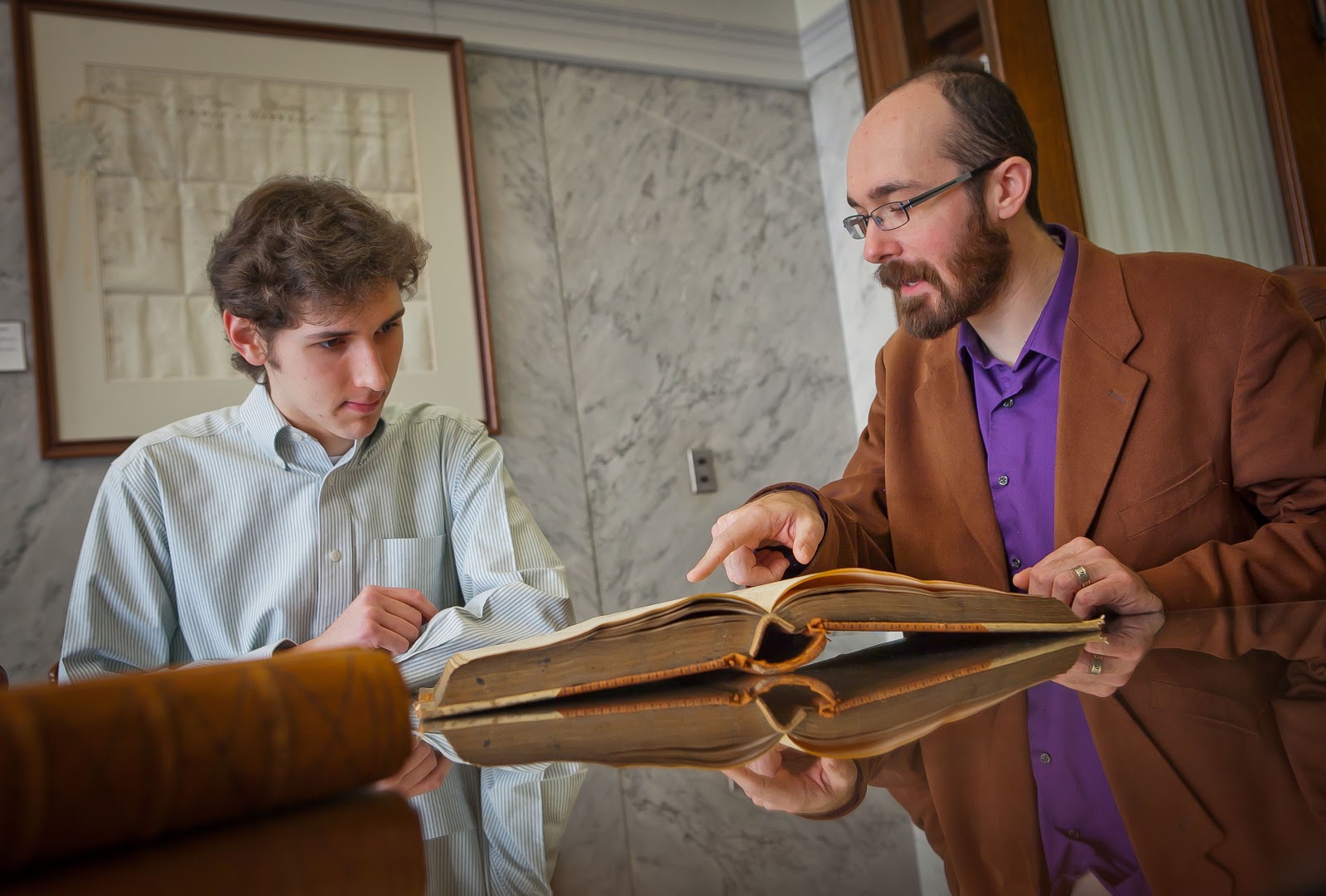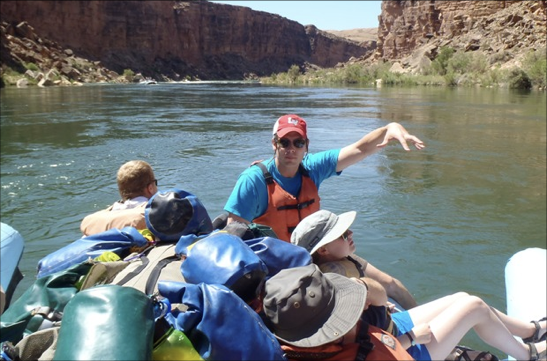Featuring 2020-2021 Distinguished Teaching Fellows

“Contemplative pedagogy, how to sit with texts, how to notice things, were things that I always brought to my students. The Distinguished Teaching Fellowship gave me the opportunity to go further and investigate what this could look like across campus.”
Christopher Phillips, Professor of English

“Field study takes place in many disciplines, from art to engineering, from sociology to geology, but this year, I had to ask myself, if we can’t go to the field to observe things, can things come to us?”
David Sunderlin, Associate Professor of Geology
The Center for the Integration of Teaching, Learning, and Scholarship offers two Distinguished Teaching Fellowships each year to support the teaching excellence of Lafayette faculty and to further their pedagogical development. Selected by the Center’s Advisory Committee, the 2020-2021 Fellows, Christopher Phillips and David Sunderlin, pursued important topics during this unprecedented year: Chris dedicated his fellowship year to contemplative pedagogy while Dave focused his attention on fieldwork and object-based learning across disciplines.
As part of their fellowship, Chris and Dave offered numerous sessions to the Lafayette and Lehigh Valley Association of Independent Colleges communities throughout the year. These sessions, which were held virtually, opened up spaces for dialogue among faculty and staff, inviting continued engagement and collaboration.
Chris offered three sessions on contemplative pedagogy and mindfulness: Small Contemplative Teaching, Contemplating Ungrading, and Contemplating Racial Justice. According to Chris,
The sessions were an opportunity to bring material to colleagues that, in some cases, I was fairly new to — with the exception of the Small Contemplative Teaching session, which built on strategies I had used in the past. The Ungrading and the Contemplating Racial Justice workshops provided me with the chance to also think about how I would do these things in my classes. The sessions were great learning experiences for me.
Chris developed the session on Ungrading, the umbrella term which describes formative assessments and which promotes moving away from letter or point grades, into a resource on Ungrading housed in the CITLS website for instructors interested in incorporating this kind of assessment strategy in their courses. The resource is an amalgam of Chris’ fellowship year efforts and it incorporates the literature and knowledge gained from sessions attended with the fellowship’s support.
Developing the resource was a way for Chris to think about how to present this content to colleagues, so it is developed with them in mind:
Both Ungrading and contemplative pedagogy are about trying to bring the student to a kind of learning that traditional methods interfere with. Some of it is deep learning or embodied learning, but also learning that doesn’t put critical thinking in an isolated container as if it were completely separate from emotion or from the body. What I realized with Ungrading is that it allows for such a radical rethinking of what we are doing in the classroom. The kind of rethinking that Ungrading requires is a lot like what we might call mindfulness.
Putting together the Ungrading resource crystalized for me that there is a family of strategies that instructors can use. And these strategies serve their own purpose for different styles, different disciplines, as well as instructors in different ranks. Some strategies are more STEM-friendly than others, and they each give different affordances.
Dave organized two sessions as part of his Field Study series, one with invited faculty who routinely incorporate fieldwork into their courses, and one with students who shared their experiences in the field. They were further developed into a resource on Field Study and Learning Outside of the Classroom.
During the faculty session, panelists Bob Mattison (Art), Andrea Smith (Anthropology and Sociology), Meg Rothenberger (Environmental Science and Studies, Biology), and Mike McGuire (Civil Engineering) discussed the ways in which they incorporate fieldwork into their courses from their particular disciplinary lens:
Each panelist is doing fieldwork looking at either a pattern of a static environment or a behavior of a dynamic environment, and I think we can learn a lot from each other in just hearing how we can go about putting field study into our teaching. I came away from the session with many ideas of what I would like to include into my field projects in addition to what I typically do.
The second session, The Field Trip: A Student Perspective, was also structured as a panel. Current and former Lafayette students shared their observations on field trips and field study. Dave was interested in incorporating students’ perspectives because:
We can also benefit from hearing from the students what they see as valuable components of field study within their education. The student panelists came from various disciplines such as art, science, anthropology and sociology, and they all had a common theme of experiencing, rather than reading about things. They discussed how knowledge about things they observed was created and how they might be knowledge-makers as they complete their studies and maybe continue onto graduate work.
The specificity of field study was severely challenged during the pandemic when fieldwork became nearly impossible to do. Yet this challenge opened up the possibility to envision the field and the work it requires differently and oriented Sunderlin toward object-based learning, a methodology that shares many attributes with fieldwork and observation.
Since the intrinsic experience of going to some place is unavailable this year, I started to think about the experience of observing the object of study, and that led to object-based learning where the object comes to you. Instead of moving through the three dimensions of the field, we are interacting with the three dimensions of the object we have in front of us.
While there are 3D models that rotate images of trilobites and clams that can be very interactive, there is nothing like holding an object. And holding requires beholding the object. I asked my students to sketch what they observed.
Dave’s session on object-based learning is taking place on Thursday, April 15, 12:10-1:00 pm; registration instructions will be announced via Lafayette Today closer to the date.
The Fellows also enjoyed the possibility of engaging in professional development opportunities outside the college attending institutes and conferences. These allowed them to participate in professional communities where they could get ideas and support and connect with larger networks of experts. Chris attended the Summer Institute with the Center for Contemplative Mind and Society, which was held as a virtual event for the first time. For Chris,
Attending the virtual event over the summer was an amazing venue to connect with practitioners from around the country, and, because it was online, it made my preparation for fall more doable. The workshop leaders and organizers modeled how to translate these practices into the Zoom virtual environment, addressing a pressing need of the current moment.
Similarly, Dave was able to attend virtual workshops organized by the Geological Society of America where fieldwork educators introduced various remote teaching strategies to accommodate for the pandemic restrictions. One workshop focused on the use of Google Earth for remote teaching while another explored activities using “GigaPans,” which are high-resolution images. A third introduced the use of virtual landscapes, where the students explore computer-generated scenes and employ the same kind of logic in visiting a virtual field site with a goal of replicating the three-dimensionality of in-person study out in the field. For Dave, these were useful professional development experiences because,
They helped me realize that while some goals are achievable in remote field education, a critical aspect of fieldwork is the in-person aspect of it. That is such an important thing that can only be understood once we don’t actually have it, as in the current moment. I gained a deeper appreciation of this topic and of our conversations around fieldwork.
Dave and Chris also co-authored a paper titled “Adapting to New Modes of Teaching During COVID-19: Developing Instructional Approaches that Empower Learners and Facilitate Virtual Learning Experiences” for the Journal of Transformative Learning with Tracie Addy, CITLS director and Associate Dean of Teaching and Learning. Co-authoring the piece revealed to both Dave and Chris how much working together throughout the year, attending each other’s sessions, and participating in these conversations had influenced the kinds of questions they were each asking as well. For Dave, this synergy was apparent in his focus on observation as a skill for fieldwork, which is similar to the kind of observation techniques that Chris’s work on mindfulness promotes. Chris sums up the experience in the following way:
Writing the article for the Journal of Transformative Learning and turning to the word “transformation” put it together for us: as a cohort, we’ve been transforming and we are all helping that to happen for each other as we’re going through the year. In some ways, that transformation was the biggest surprise of the year. We didn’t just have interesting projects in separate disciplines; rather, we are really helping each other.
The conversations regarding the development of the piece revealed to the fellows the similarities in terms of their teaching pedagogies across disciplines, as Sunderlin put it: “it was fascinating to realize that Chris and I share so much in common regarding our approaches to teaching regardless of disciplinary differences.”
As a final note, the Fellows reflected on their reasons for applying to the Fellowship last year in the following ways. For Dave,
I applied to the Fellowship because I wanted to learn more about my topic but, more importantly, because I wanted to learn more about what other Lafayette professors do in their classes. This year has been an opportunity to have those conversations and to really learn from each other.
Chris echoed a similar sentiment in his description of his motivation to apply:
Applying for the Distinguished Teaching Fellowship was one of the best choices I have made as a Lafayette College professor. It provided me with the opportunity to do the kind of learning I love to do (learning about learning and learning about myself), and the social and communal dimensions have had so many high points in so many different directions. I encourage others to apply too.
Chris and Dave have done a fantastic job this year contributing to teaching excellence at Lafayette College. Their work will continue to inspire the Lafayette community for years to come.
Apply to become a Distinguished Teaching Fellow. The deadline to apply is Friday, April 16. Read more about the application process here.